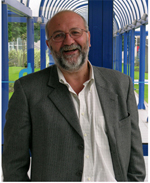15 mars 2012: Prof. Michael Hengartner & Prof. Pier Giuseppe Pelicci
Thursday, March 15th, 12h30 - 13h30
"Cancer: From Death to Resurrection
Apoptosis & Stem Cells Biology"
Prof. Michael Hengartner (Host: Prof. Dominique Belin, PATIM)
Dean Faculty of Science, University of Zürich
Professor of Molecular Biology
Institute of Molecular Life Science, University of Zürich

Conference:
Genetic analysis of DNA damage and chemotherapy angent-induced apopotosis in the nematode C. Elegans Multicellular organisms use programmed cell death (apoptosis) to remove cells that are superfluous, in the way, or potentially dangerous. The nematode C. elegans uses programmed cell death to remove 131 of the 1090 somatic cells generated during its development. In addition to these developmental cell deaths, apoptosis is also observed in the adult female germ line, where it culls about half of all developing oocytes. Germ cells, unlike somatic cells, can also activate apoptosis in response to environmental stresses or insults. We have used this feature to study the pathways that induce germ cell apoptosis in response to two stimuli that are relevant to cancer development and therapy, namely DNA damage and exposure to chemotherapeutic agents. In my talk, I will briefly summarize what we have learned about the various signaling pathways that activate apoptosis in response to ionizing radiation or UV light, DNA damaging agents, and microtubule-binding drugs such as vincristine.Michael Hengartner's Biography
tMichael O. Hengartner is professor at the Institute of Molecular Life Sciences and dean of the Faculty of Science of the University of Zurich in Switzerland. Michael was introduced to C. elegans as a PhD student in the lab of H. Robert Horvitz at MIT, where he contributed to the elucidation of the molecular machinery that controls apoptosis in this species. Michael has continued to work with C. elegans ever since, first as a group leader at Cold Spring Harbor Laboratory, and for the last ten years as professor of molecular biology in Zurich. Michael is a member of EMBO, a fellow of the AAAS, a member of the Deutsche Akademie der Naturforscher Leopoldina, and a recipient of the Swiss National Latsis Prize. Besides apoptosis, Michael is also interested in the evolution of proteomes and the regulation of mRNAs by miRNAs and RNA-binding proteins. He is the founding chair of the HUPO initiative on Model Organism Proteomes, and co-initiator of the Basel Declaration.
_________________________________________________________________________________________
Prof. Pier Giuseppe Pelicci M.D., PhD. (Host: Luca Scorrano, PHYME)
Scientific Co-Director, Chairman of Experimental Oncology Dept.,
IEO (European Institute of Oncology), Milan

Conference:
"Regulation of Self-Renewal in Cancer Stem Cells"
Pier Giuseppe Pelicci 's Biography
Prof. Pier Giuseppe Pelicci is Co-Scientific Director of the European Institute of Oncology, Chairman of the Department of Experimental Oncology (DEO) at the European Institute of Oncology, Milan (Italy), Scientific Director of the SEMM Foundation (European School of Molecular Medicine, Milan, Italy) and President of the Cogentech Consortium. IEO is a comprehensive cancer center focused on advanced treatments, diagnostics, clinical trials, cancer prevention, training, higher education and advanced research. SEMM is private foundation whose mission is to foster innovative education in molecular medicine, medical nanotechnology and bio-ethics. Cogentech is a Consortium owned by IEO and IFOM whose mission is the development of biomedical technological platforms for genomic research and Molecular Medicine programs. At IEO, P. G. Pelicci is responsible for the strategic planning of the IEO institute research programs, including basic, translational (Molecular Medicine Program) and clinical research. At SEMM, P. G. Pelicci is responsible for the development of three PhD programs (Molecular Medicine, Medical Nanotechnology, Life sciences: foundations & ethics).
Prof. Pelicci is member of the American Association for Cancer Research, the European Molecular Biology Organization, the European Haematology Association, the European Society for Engineering and Medicine, the European Cytokine Society, The New York Academy of Sciences, the American Society for Microbiology, the Italian Association of Biophysics and Molecular Biology, the Italian Society of Cancerology. He is past president (1998-2000) of the Italian Society of Experimental Hematology.
Prof. Pelicci was honored with several prestigious international fellowships and awards, such as the "C. Cioffrese" Prize for Cancer Research (Fondazione Carlo Erba, Italy), the “Foundation Chiara d’Onofrio” (Italy), the “Guido Venosta” Prize of the Italian Foundation for Cancer Research, the Award for “Excellence in Medicine” of the American-Italian Foundation for Cancer Research (New York, US), the H. S. Raffaele Prize (Italy). He is presently Full Professor of Pathology at the University of Milan and cofounder of the Biotech holding Genextra. Genextra controls four Biotech companies (Congenia, DAC, Tethis and Intercept).
Prof. Pelicci is co-founder and co-director of the IFOM-IEO Campus, a research infrastructure that host IFOM, the IEO laboratory research activities, SEMM, Genextra and Cogentech.
